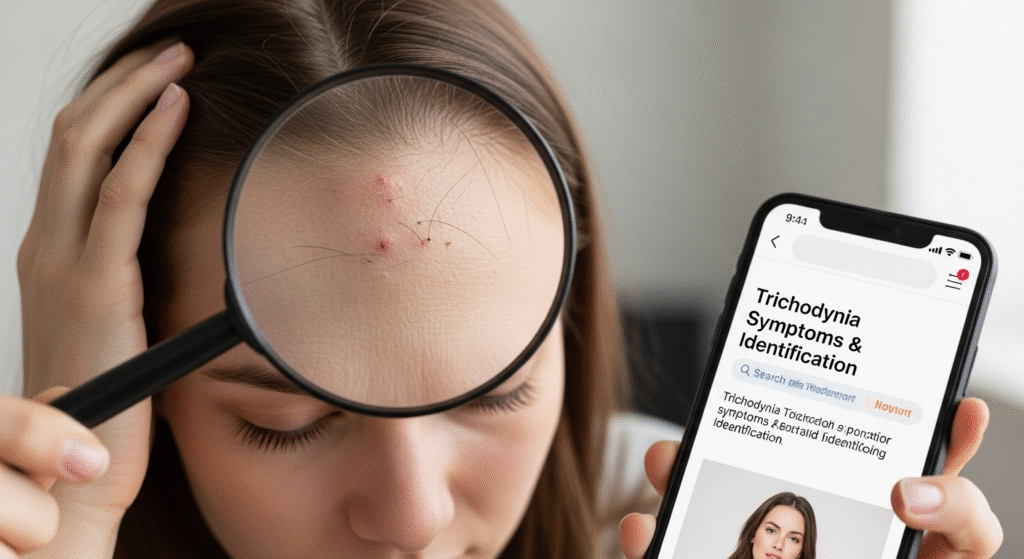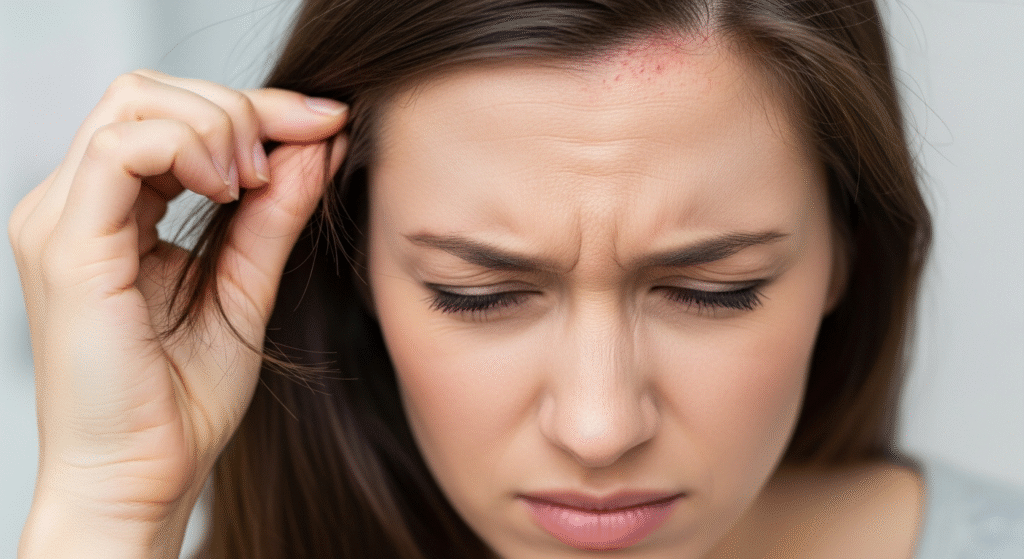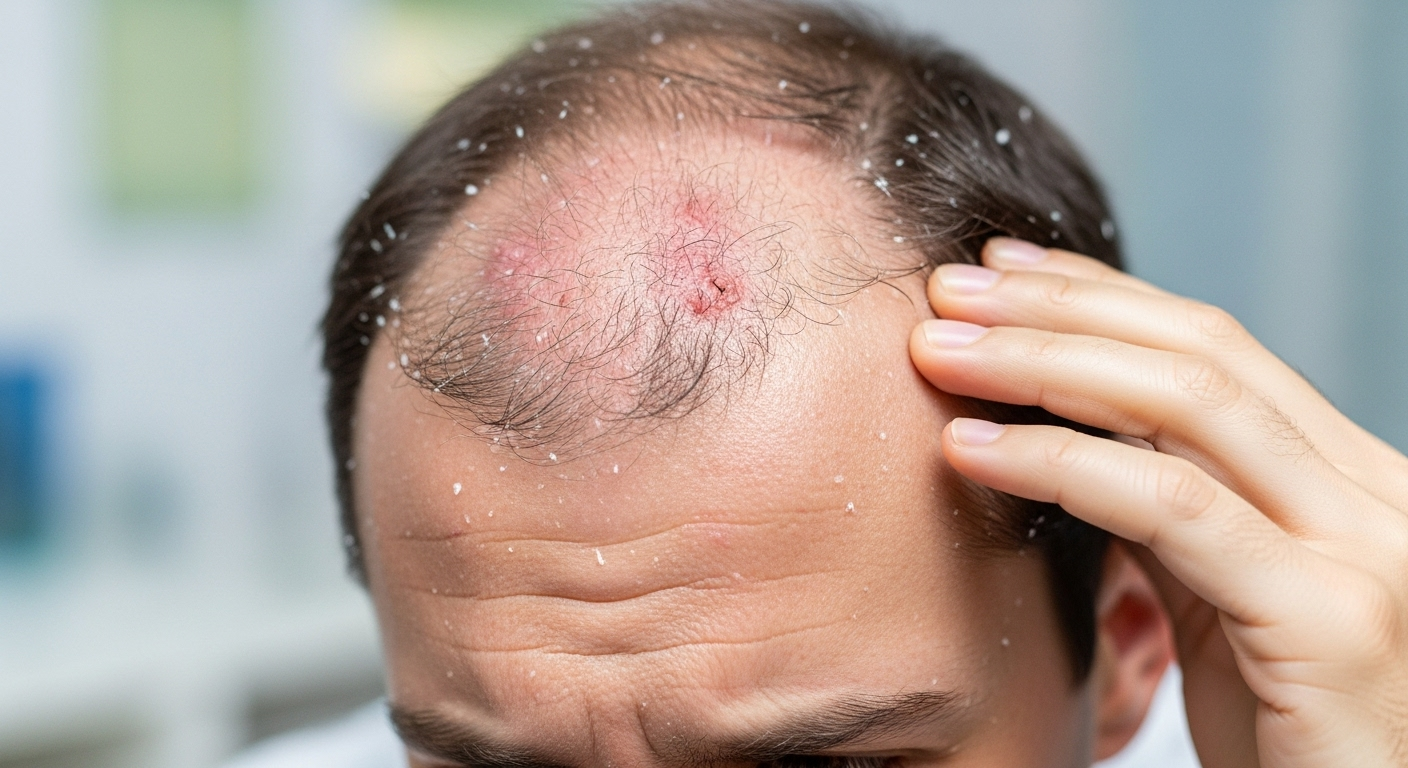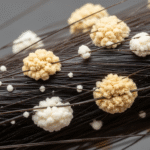Trichodynia hairloss, also known as scalp pain or tenderness, is a condition that causes discomfort on the scalp, often linked to hair loss or other scalp issues. If you're experiencing a sensitive or painful scalp, you might be dealing with trichodynia. This article will explore the causes of trichodynia, its symptoms, and the best ways …
Trichodynia hairloss, also known as scalp pain or tenderness, is a condition that causes discomfort on the scalp, often linked to hair loss or other scalp issues. If you’re experiencing a sensitive or painful scalp, you might be dealing with trichodynia.
This article will explore the causes of trichodynia, its symptoms, and the best ways to treat and manage the condition. By reading this, you’ll gain valuable insights into how to alleviate scalp discomfort and promote overall scalp health.

What is Trichodynia? Understanding the Condition
Trichodynia is a condition that causes pain, tenderness, or discomfort on the scalp. People with trichodynia often report feeling pain when combing or touching their hair, and it may be associated with hair thinning or hair loss. This condition is often described as a “tight” or “burning” feeling on the scalp.
- Is Trichodynia the Same as Other Scalp Conditions?
While trichodynia shares some symptoms with other scalp issues like seborrheic dermatitis or folliculitis, it is distinct because it specifically refers to pain or sensitivity. It’s not an infection or inflammation, but rather a response to irritation or stress. - Trichodynia and Hair Loss:
Although trichodynia is primarily a pain-related condition, it can sometimes be linked to hair loss. The condition can occur alongside hair thinning, often affecting individuals experiencing stress or hormonal changes.
Causes of Trichodynia hairloss: What Triggers Scalp Pain?
The causes of trichodynia can vary, and in many cases, the pain is a result of multiple contributing factors. Below are some of the common triggers for this condition.
- Stress and Anxiety:
Emotional stress and anxiety can lead to tension on the scalp muscles, which can cause pain or tenderness. This type of trichodynia is often temporary and improves when stress is reduced. - Hair Treatments:
Frequent use of chemical treatments like hair dyes, perms, or relaxers can irritate the scalp, leading to pain and sensitivity. Excessive styling or tight hairstyles, such as ponytails, can also contribute to scalp discomfort. - Scalp Infections:
Fungal or bacterial infections, such as dandruff or folliculitis, can cause scalp pain. Infections can irritate hair follicles, leading to inflammation and tenderness. - Nutritional Deficiencies:
Lack of certain nutrients, such as biotin, zinc, or vitamins B and D, can affect scalp health and contribute to pain and thinning hair. Malnutrition can weaken hair follicles, leading to sensitivity. - Medical Conditions:
Conditions like alopecia areata, scalp psoriasis, or seborrheic dermatitis can cause scalp inflammation, which may lead to trichodynia. In these cases, treating the underlying condition is key to alleviating pain.
Symptoms of Trichodynia: How to Identify the Condition

Trichodynia is primarily marked by pain or sensitivity on the scalp, but the symptoms can vary from person to person. Here are some of the key signs to watch for:
- Scalp Tenderness:
The most common symptom of trichodynia is scalp tenderness. This may feel like a burning, tight, or aching sensation, especially when the scalp is touched or massaged. - Pain During Hair Care:
Individuals with trichodynia may experience discomfort when combing, brushing, or washing their hair. This pain can range from mild to severe. - Increased Hair Shedding:
Although trichodynia is not directly related to hair loss, it can occur alongside hair thinning or shedding. The pain might be felt in areas where hair loss is more noticeable. - Pain After Certain Hair Treatments:
If you’ve recently undergone hair treatments, such as coloring or styling, and experience discomfort afterward, it could be a sign of trichodynia.
Pro Tip:
Keep track of when the pain occurs and what activities seem to trigger it. This can help you identify patterns and factors that contribute to your scalp pain.
Diagnosing Trichodynia: When to See a Doctor
If you’re experiencing persistent scalp pain, it’s important to consult with a healthcare provider to determine the cause. Diagnosing trichodynia involves a comprehensive evaluation, including:
- Medical History:
Your doctor will review your health history, including any recent stress, hair treatments, or underlying medical conditions that might be contributing to your symptoms. - Physical Examination:
A dermatologist or trichologist will examine your scalp for signs of infection, inflammation, or other scalp conditions. - Blood Tests:
If the cause of trichodynia is unclear, your doctor may recommend blood tests to check for nutritional deficiencies or hormonal imbalances.
Treatment Options for Trichodynia: How to Relieve Scalp Pain
Managing trichodynia typically involves addressing the underlying cause and relieving pain. Here are some common treatment options:
- Topical Treatments:
Medicated shampoos or creams that contain antifungal or anti-inflammatory ingredients may help reduce pain and inflammation on the scalp. - Stress Management:
Since stress is a significant trigger for trichodynia, adopting stress-relieving practices like yoga, meditation, or deep-breathing exercises can be beneficial. - Nutritional Support:
Ensure you’re getting enough vitamins and minerals to support healthy hair and scalp. Supplements like biotin, zinc, and vitamin D can strengthen hair follicles and improve scalp health. - Hair Care Adjustments:
Switch to gentle, sulfate-free shampoos and avoid harsh hair treatments or tight hairstyles that put stress on the scalp. - Pain Relief Options:
Over-the-counter pain relievers, such as ibuprofen, can help reduce inflammation and pain. In some cases, a doctor may prescribe stronger medications if the pain is severe.
Managing Hair Loss Linked to Trichodynia
Trichodynia can sometimes be associated with hair loss, especially if it is caused by underlying conditions like alopecia. Here’s how to manage hair thinning while addressing trichodynia:
- Treat the Pain and the Cause:
Managing trichodynia can help reduce the risk of further hair loss. Seek treatment for both the pain and the underlying condition causing hair thinning. - Hair Growth Treatments:
If you’re experiencing hair loss, treatments like minoxidil or platelet-rich plasma (PRP) therapy may help stimulate hair growth and improve scalp health. - Consult a Trichologist:
A trichologist can offer personalized solutions for managing hair loss and trichodynia, helping you restore a healthy scalp.
FAQs
Can trichodynia lead to permanent hair loss?
No, trichodynia itself does not cause permanent hair loss, but it may be linked to conditions that contribute to hair thinning or shedding.
How long does trichodynia last?
Trichodynia can last for a few weeks to months, depending on the underlying cause. Stress-related trichodynia often resolves once stress is managed.
Is trichodynia caused by stress?
Yes, emotional stress is a common trigger for trichodynia. Managing stress through relaxation techniques can help alleviate scalp pain.
What’s the difference between trichodynia and seborrheic dermatitis?
Trichodynia is primarily characterized by pain or tenderness on the scalp, while seborrheic dermatitis involves flaky, itchy skin and scalp irritation.
Conclusion: Understanding and Managing Trichodynia
Trichodynia is a painful scalp condition that can significantly affect your quality of life, but it is manageable with the right treatment. Whether your trichodynia is caused by stress, hair treatments, or an underlying scalp condition, proper care and treatment can help alleviate discomfort and restore scalp health. If you’re experiencing persistent symptoms, consult with a healthcare provider to find the best course of action.
Book a Consultation for Scalp Health and Hair Loss Treatment
If you’re struggling with trichodynia or scalp pain, it’s important to seek professional guidance. Book a consultation with Dr. Uzma Irfan, an ISHRS-certified surgeon in Islamabad today to discuss your scalp health and find the right treatment for your needs.






